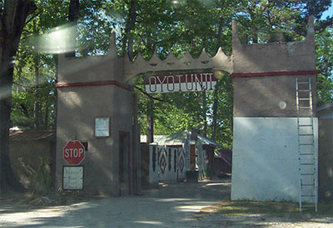An African kingdom in America – Kingdom of Oyotunji, Nigeria;
Special Issue: The Untold Story of Blacks in the White House
American Visions, Feb-March, 1995 by Beirne Keefer
Pass through the gates and enter the Kingdom of Oyotunji, Nigeria. Capital of the Yoruba people of the Western Hemisphere, Oyotunji welcomes visitors with a sign that reads, “You are now leaving the United States and entering this Kingdom.” Once you have entered, you are, for all purposes, in Nigeria. Oyotunji is a mysterious little village nestled snugly in Beaufort County, S.C. Such modem cities as Charleston, S.C., to the north and Savannah, Ga., to the south are forgotten in this 10-acre paradise of the Yoruba people. His Royal Highness Oba Oseijeman, crowned in 1981 in Ife, Nigeria, reigns over all Yorubas in the Western Hemisphere from this post in South Carolina.
Make no mistake: This is a Yoruba kingdom, and its residents practice a lifestyle that dates back more than 5,000 years. “If you understand the Greeks and their religion, then you’ll understand the Yoruba,” says my guide, Baba Obafemi, priest of Osun and Ogungun. “Our ancient people studied the planets, and our gods are named after those heavenly bodies.”
A slight but powerful man, Obafemi speaks in a soft, lyrical voice. “Many scoff,” he says. “Even many African Americans have turned their backs on us and their roots, but we celebrate our 25th anniversary this year. We’ve had to struggle to build our village, but we have followers from across the U.S. and Canada, and we’ll continue to grow.”
He adds, with a twinkling eye, “Our women have never needed the women’s rights movement. They have always been in charge.”
According to Obafemi, not only do women dictate the homes they and their new husbands will have, but husbands also are required to have enough money to finance their wives in the businesses they desire. For those and other reasons, young women are allowed to marry in their early teenage years, and they are allowed to marry men 10 to 15 years their seniors. “They need older men who are established in business and who can take care of them,” says Her Royal Grace Iya Orite.
Yoruba first took hold here in the 1960s. Oseijeman was part of that movement, being one of the senior members of the political group formed to start the Republic of New Africa, an idea born in Harlem to promote a new Africa in the United States by having the American people give them five states. “We were searching for something to fill in that great rupture in our heritage caused by slavery, and many of us found it with the Yorubas,” Oseijeman explains.
Early on, Oseijeman saw that the movement was doomed to failure. “There was too much idle talk about getting a huge piece of the United States, and not enough on our work ethics,” he says. He knew that the only way to return to his African roots was to find land, buy it and build a Yoruba village. He and his followers founded their village in swampy, overgrown and infested acreage in South Carolina’s southeastern low country because of one man–Martin Delany.
It was Delany who, just after the Civil War, encouraged newly freed blacks to solidify their freedom through the acquisition and efficient management of land. Gen. William T. Sherman had issued Special Field Order No. 15, setting aside a portion of the low country rice coast south of Charleston for the exclusive settlement of blacks. Delany, then an agent of the Freedmen’s Bureau in South Carolina, promoted the idea that freedom was meaningless without a solid economic base. Today, many black landowners in the immediate region of the Yoruba village trace their ownership back to that period. “So you see, we’re right in the middle of that history,” says Obafemi.
In spite of rumors (a particularly vicious one is that any white man caught on the property after dark never leaves the village), the Yorubas are a hard-working, pleasant and studious people who welcome everyone to spend a day, a weekend or a year with them.
“We actively seek people to visit with us,” says Iya Orite. “It’s the only way we can let people know about our wonderful culture and lifestyle.” Bierne Keefer is a freelance travel writer in Clearwater, Fla.
Special Issue: The Untold Story of Blacks in the White House
American Visions, Feb-March, 1995 by Beirne Keefer
Pass through the gates and enter the Kingdom of Oyotunji, Nigeria. Capital of the Yoruba people of the Western Hemisphere, Oyotunji welcomes visitors with a sign that reads, “You are now leaving the United States and entering this Kingdom.” Once you have entered, you are, for all purposes, in Nigeria. Oyotunji is a mysterious little village nestled snugly in Beaufort County, S.C. Such modem cities as Charleston, S.C., to the north and Savannah, Ga., to the south are forgotten in this 10-acre paradise of the Yoruba people. His Royal Highness Oba Oseijeman, crowned in 1981 in Ife, Nigeria, reigns over all Yorubas in the Western Hemisphere from this post in South Carolina.
Make no mistake: This is a Yoruba kingdom, and its residents practice a lifestyle that dates back more than 5,000 years. “If you understand the Greeks and their religion, then you’ll understand the Yoruba,” says my guide, Baba Obafemi, priest of Osun and Ogungun. “Our ancient people studied the planets, and our gods are named after those heavenly bodies.”
A slight but powerful man, Obafemi speaks in a soft, lyrical voice. “Many scoff,” he says. “Even many African Americans have turned their backs on us and their roots, but we celebrate our 25th anniversary this year. We’ve had to struggle to build our village, but we have followers from across the U.S. and Canada, and we’ll continue to grow.”
He adds, with a twinkling eye, “Our women have never needed the women’s rights movement. They have always been in charge.”
According to Obafemi, not only do women dictate the homes they and their new husbands will have, but husbands also are required to have enough money to finance their wives in the businesses they desire. For those and other reasons, young women are allowed to marry in their early teenage years, and they are allowed to marry men 10 to 15 years their seniors. “They need older men who are established in business and who can take care of them,” says Her Royal Grace Iya Orite.
Yoruba first took hold here in the 1960s. Oseijeman was part of that movement, being one of the senior members of the political group formed to start the Republic of New Africa, an idea born in Harlem to promote a new Africa in the United States by having the American people give them five states. “We were searching for something to fill in that great rupture in our heritage caused by slavery, and many of us found it with the Yorubas,” Oseijeman explains.
Early on, Oseijeman saw that the movement was doomed to failure. “There was too much idle talk about getting a huge piece of the United States, and not enough on our work ethics,” he says. He knew that the only way to return to his African roots was to find land, buy it and build a Yoruba village. He and his followers founded their village in swampy, overgrown and infested acreage in South Carolina’s southeastern low country because of one man–Martin Delany.
It was Delany who, just after the Civil War, encouraged newly freed blacks to solidify their freedom through the acquisition and efficient management of land. Gen. William T. Sherman had issued Special Field Order No. 15, setting aside a portion of the low country rice coast south of Charleston for the exclusive settlement of blacks. Delany, then an agent of the Freedmen’s Bureau in South Carolina, promoted the idea that freedom was meaningless without a solid economic base. Today, many black landowners in the immediate region of the Yoruba village trace their ownership back to that period. “So you see, we’re right in the middle of that history,” says Obafemi.
In spite of rumors (a particularly vicious one is that any white man caught on the property after dark never leaves the village), the Yorubas are a hard-working, pleasant and studious people who welcome everyone to spend a day, a weekend or a year with them.
“We actively seek people to visit with us,” says Iya Orite. “It’s the only way we can let people know about our wonderful culture and lifestyle.” Bierne Keefer is a freelance travel writer in Clearwater, Fla.
Most Frequently Visited PagesRequest an International Invitation Letter
|
Contribute to OAV |
Website: http://www.oyotunji.org Email: [email protected] Hours of Operation: 11 a.m.- Dusk Location: 56 Bryant Lane Seabrook, SC 29940 |
OYOTUNJI.ORG


